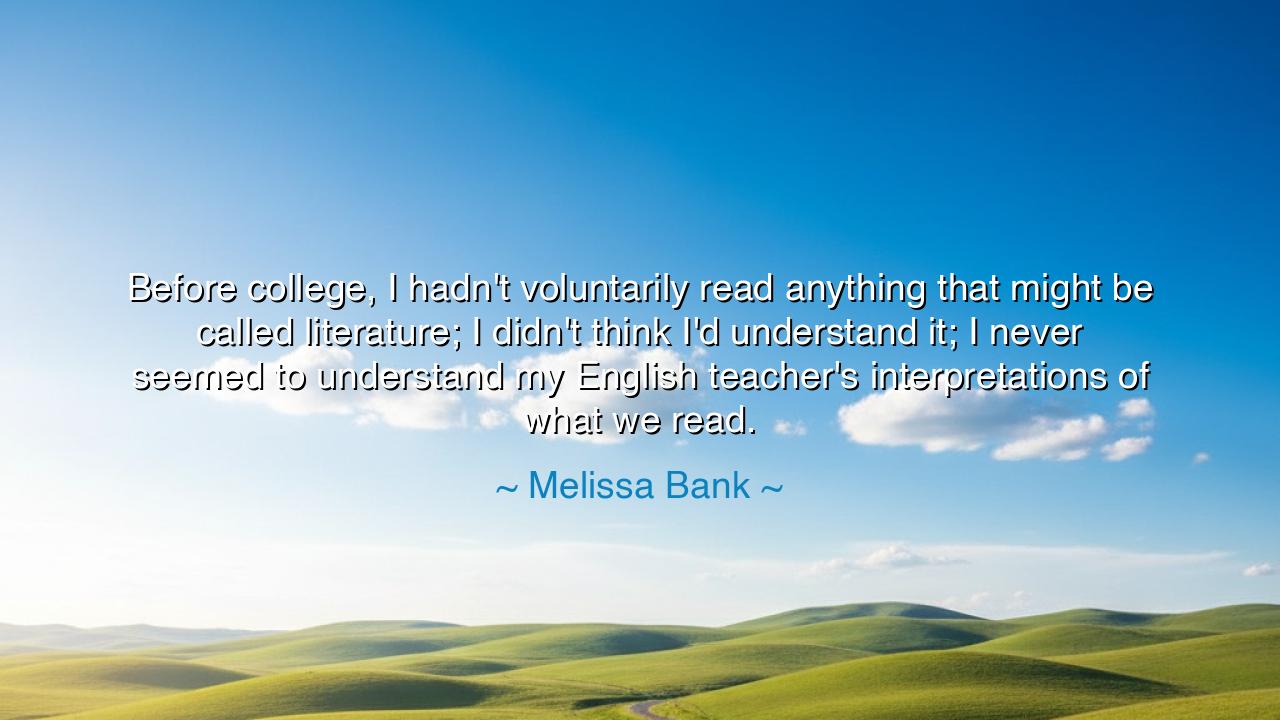
Before college, I hadn't voluntarily read anything that might be
Before college, I hadn't voluntarily read anything that might be called literature; I didn't think I'd understand it; I never seemed to understand my English teacher's interpretations of what we read.






Hear the honest confession of Melissa Bank, who declared: “Before college, I hadn't voluntarily read anything that might be called literature; I didn't think I'd understand it; I never seemed to understand my English teacher's interpretations of what we read.” In these words lies the story of many souls, who, before they taste wisdom for themselves, feel estranged from it, as though it belonged to others more gifted, more chosen. She speaks not with shame, but with clarity: that the love of knowledge and the treasures of literature are often hidden, not because they are beyond us, but because we are not yet ready to claim them as our own.
To say, “I didn't think I'd understand it” is to reveal a wall that many encounter in youth: the fear that wisdom is a secret language reserved for the few. Teachers may present their interpretations, but the student, hearing only conclusions and not yet feeling the pulse of the words, may feel like an outsider, shut out from the feast of meaning. Melissa Bank names this alienation plainly. It is not the fault of the books, nor entirely of the teacher, but of the distance between a soul still forming and the depths that literature asks it to plumb.
History gives us countless examples of this struggle. Consider the young St. Augustine, who in his Confessions admitted that, as a boy, he cared little for the beauty of Homer and found his lessons dull. He turned from the ancient epics with disdain, not because they lacked greatness, but because his spirit was not yet awakened to receive them. In later years, when his heart was pierced by deeper questions, those same texts became alive with meaning. What Melissa Bank speaks of is the same: that wisdom often waits until the soul ripens, until the mind hungers, before it can be understood.
Her words also remind us of a deeper truth: understanding is not the same as memorizing another’s interpretation. The English teacher may give meaning, but literature is not meant to be received passively; it must be wrestled with, entered into, and lived. True understanding is not secondhand but personal, born of the reader’s own encounter with the words. When Bank could not grasp her teacher’s explanations, she thought herself unfit. But the reality was this: her true encounter with literature was yet to come, and when it did, it would be her own.
The wisdom here is powerful: do not despise yourself if wisdom feels distant. All great knowledge requires a season of waiting, a moment of awakening. What is obscure in one stage of life becomes luminous in another. The oak that looks lifeless in winter will one day bloom with leaves. The student who feels ignorant may one day teach others. Melissa Bank, once alienated from literature, became herself a writer—proof that what seems foreign at first may, in time, become the very core of one’s destiny.
The lesson, then, is to be patient with learning, and gentle with yourself in the struggle for understanding. Read, even when you do not fully grasp. Return, even when the words feel heavy. For the meaning of great works unfolds slowly, like dawn breaking over the horizon. And if you are a teacher, remember: your role is not only to interpret but to awaken the hunger in your students, to help them believe that the feast of literature belongs to them, too.
So I say to you, seekers of wisdom: do not be discouraged when you stand before great books and feel small. All who have walked this path began as strangers. But if you persist, if you read with patience and with openness, the words will one day open to you, and you will discover that literature was not distant after all—it was waiting for you to grow into it. As Melissa Bank’s life shows, the door that once seemed closed may become the very doorway to your calling.






AAdministratorAdministrator
Welcome, honored guests. Please leave a comment, we will respond soon